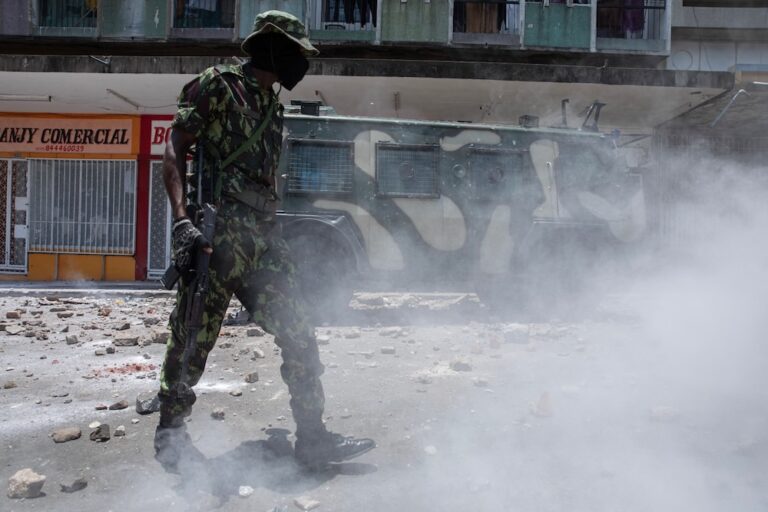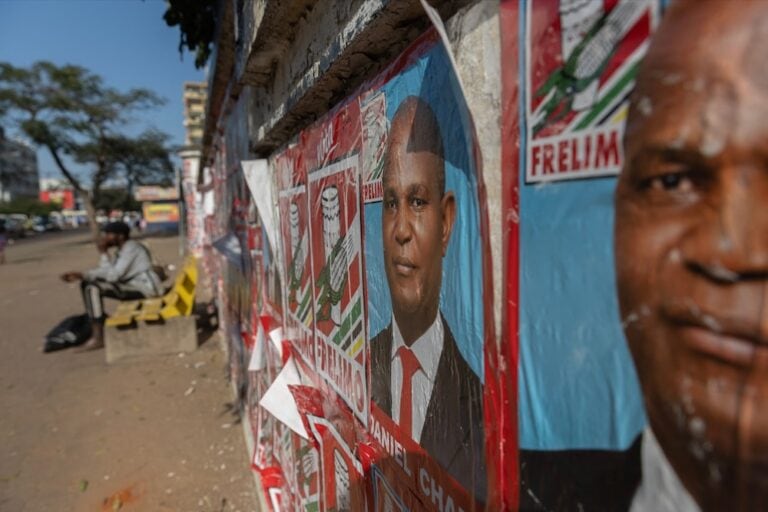(MISA/IFEX) – Mozambique’s main opposition party, Renamo, has told the daily paper “Noticias” not to cover any of the election campaign activities of its leader and presidential candidate, Afonso Dhlakama. **Updates IFEX alerts of 16 November and 28 October 1999** The director of the Renamo election office, Manuel Frank, and Dhlakama’s election agent, Luis Gouveia, […]
(MISA/IFEX) – Mozambique’s main opposition party, Renamo, has told the daily
paper “Noticias” not to cover any of the election campaign activities of its
leader and presidential candidate, Afonso Dhlakama.
**Updates IFEX alerts of 16 November and 28 October 1999**
The director of the Renamo election office, Manuel Frank, and Dhlakama’s
election agent, Luis Gouveia, visited the “Noticias” newsroom on 11 November
1999 to inform the paper that Dhlakama had decided he could do without its
coverage because the paper allegedly was biased against him, and in favour
of the ruling Frelimo Party. The two further “invited” the “Noticias”
reporters to stop covering the campaign.
Renamo levelled two specific complaints against the paper. First they
claimed that “Noticias” systematically understated the number of people
attending Dhlakama’s rallies. “Noticias” talked of “hundreds of people”
listening to the Renamo leader, while Renamo claimed that “thousands and
thousands” were in attendance.
The second complaint concerned clashes between Renamo and Frelimo supporters
in Chokwe, in the southern province of Gaza, in October. The two Renamo
officials claimed that “Noticias” had blamed Renamo for the disturbances,
while other media blamed Frelimo.
In response to these allegations, in an editorial, “Noticias” said the
estimates of the number of people at Dhlakama’s rallies were based on the
evidence of its reporters’ own eyes. As for the Chokwe incidents, “Noticias”
pointed out that it printed what its reporter saw – which was that the
clashes began when a group of Frelimo supporters tried to block the passage
of Dhlakama’s motorcade. In other words, “Noticias” clearly stated that it
was Frelimo, not Renamo, that started the violence – a version which had
been hotly contested by the Frelimo leadership.
The Mozambican news agency, AIM, further reported that the “Noticias”
reporter in Chokwe, Mussa Mohamed, had written a signed article condemning
both Frelimo and Renamo for the incidents, stating that Frelimo
parliamentarians had put themselves at the head of the rioting, and calling
for a more civilised approach to campaigning.
“Noticias”, in its editorial, stated that, in accordance with journalism
ethics, and with the country’s press law, the paper “has space to publish
denials” by those who feel they have been inaccurately reported about, but
added that “we cannot accept veiled attempts to silence us.”
By “inviting” the paper to abandon Dhlakama’s campaign, the editorial said
Renamo “is attacking a principle enshrined in the constitution, which is the
right of journalists to enjoy access to sources of information.”
Renamo’s position “collides frontally with press freedom, which we believe
it is in the interests of all to preserve,” the editorial concluded.
Background Information
The first hint that Renamo might try to keep selected media away from its
election campaign came on 24 October, when the Renamo political delegate in
the central province of Sofala, Manuel Pereira, attacked the accuracy of the
coverage of a Beira rally by Mozambican Television (TVM), and by the Beira
paper “Diario de Mocambique”. He suggested that Renamo “can dispense with
coverage by the media.”
However, when AIM raised this matter a few days later with the spokesman in
Maputo for the Renamo election office, Gulamo Jafar, he said that this was
just Pereira letting off steam, and that Renamo had no intention of banning
reporters.
Recommended Action
Send appeals to the president of Renamo:
paper
to refrain from covering Renamo election activities
“Noticias”, which has far reaching implications for press freedom in
Mozambique
from
gaining free access to sources of information about Renamo, while also
opening up those reporters to the threat of violence and intimidation in the
event of covering Renamo activities
media should be able to freely and vigorously report on public statements
made by election candidates and political parties so that such statements
can be effectively publicised and publicly scrutinised
to
an attempt by the party to restrict public scrutiny of the party and the
statements made by its leaders
upholds the right of reply in the case of false media coverage
other acceptable means of correcting false media coverage, such as the
complaints mechanism provided for by the Supreme Media Council
“Noticias”
and to further ensure the unhindered access to and safety of journalists at
public meetings and gatherings of Renamo
Appeals To
Afonso Dhlakama
President of Renamo
Fax: +258 1 499701
Please copy appeals to the source if possible.


